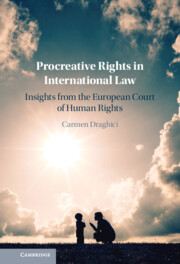Book contents
- Procreative Rights in International Law
- Procreative Rights in International Law
- Copyright page
- Dedication
- Contents
- Table of International Cases
- Table of International Instruments
- Introduction
- 1 Parenthood Aspirations and Justiciable Rights
- 2 A Right to a Genetically Related Child?
- 3 A Right to the Recognition of Intentional Parenthood?
- 4 A Right to a Healthy Child?
- 5 The Quest for Reproductive Equality
- Conclusions
- Select Bibliography
- Index
4 - A Right to a Healthy Child?
From Medical Therapy to Eugenic Selection
Published online by Cambridge University Press: 26 April 2024
- Procreative Rights in International Law
- Procreative Rights in International Law
- Copyright page
- Dedication
- Contents
- Table of International Cases
- Table of International Instruments
- Introduction
- 1 Parenthood Aspirations and Justiciable Rights
- 2 A Right to a Genetically Related Child?
- 3 A Right to the Recognition of Intentional Parenthood?
- 4 A Right to a Healthy Child?
- 5 The Quest for Reproductive Equality
- Conclusions
- Select Bibliography
- Index
Summary
Chapter 4 argues that there is a (limited) human right to a healthy child, to the extent that medical technologies are available to detect and prevent disease in the future offspring at the conception or gestation stage. It considers two claims arising in Strasbourg litigation: access to timely, accurate prenatal testing and to the termination of pregnancy on grounds of foetal abnormality, and the selection of healthy embryos through pre-implantation genetic diagnosis by aspiring parents afflicted by serious hereditary illnesses. While many judgments are country-specific and regard the failure to correctly implement existing laws or the adequacy of remedies in case of errors, the chapter also questions the legitimacy of total bans on embryo/foetal selection against disability; it maintains that, notwithstanding possible objections based on, inter alia, the message sent by permissive laws to existing disabled people and the human dignity rhetoric, they fail to satisfy the principle of proportionality.
Keywords
- Type
- Chapter
- Information
- Procreative Rights in International LawInsights from the European Court of Human Rights, pp. 168 - 233Publisher: Cambridge University PressPrint publication year: 2024

